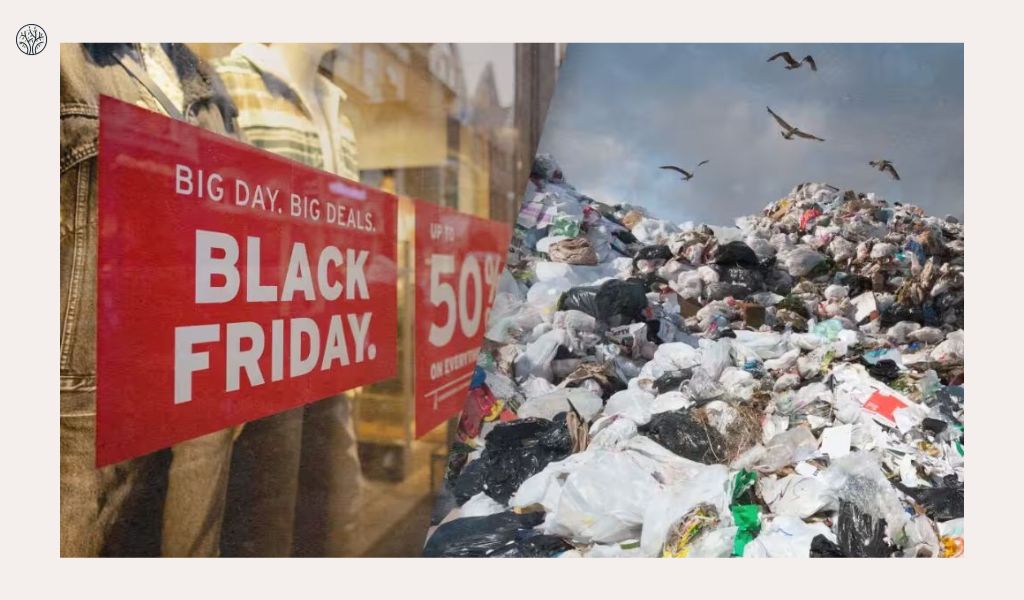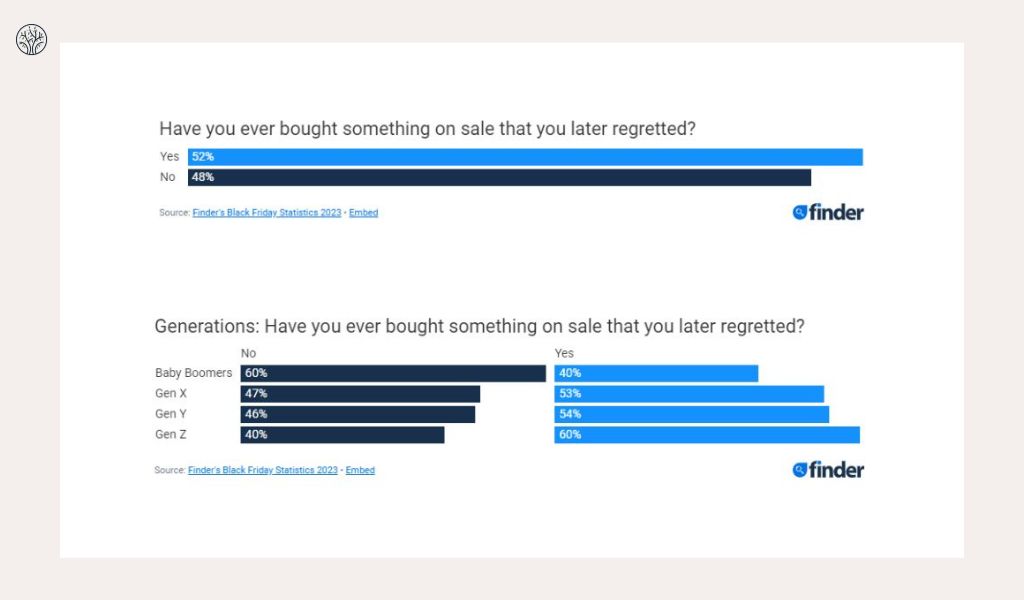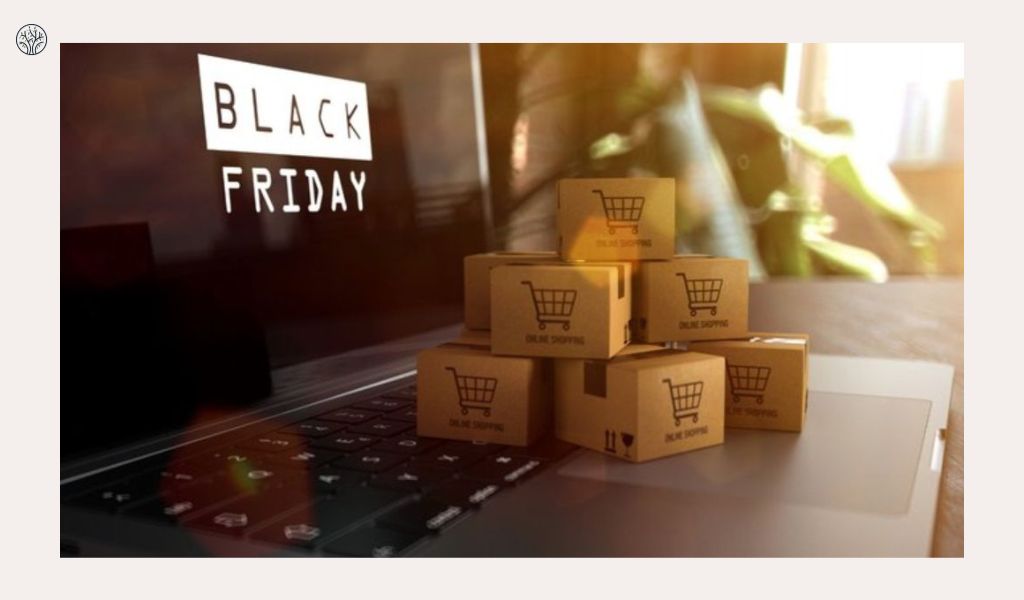Black Friday is one of the biggest shopping days, with almost 190 million shoppers joining last year. This event brings us countless benefits, such as allowing you to buy cheap gifts, contributing to economic stimulation, and allowing businesses to clear excess stock. However, one fact might surprise you: Black Friday is not as good as it seems.
Not only to the planet but also to ethical consumption, society, and small businesses, this shopping day has many negative impacts you are unaware of. In this article, let’s discuss this topic and explore why Black Friday is bad.
Key Takeaways
- Black Friday significantly increases waste, water consumption, and carbon emissions.
- The focus on low prices overshadows ethical brands that prioritize sustainability and fair labor practices.
- Black Friday promotes a culture of impulsive buying, leading to regrettable purchases. Over half of the consumers admit to regretting impulsive buys made during Black Friday sales.
- Small businesses struggle to compete with the deep discounts offered by larger retailers, often resulting in diminished sales and financial challenges for these smaller entities.
- There’s a growing awareness of Black Friday’s negative aspects, leading to potential shifts in consumer behavior. This includes focusing on sustainability, supporting local businesses, and making more conscious buying decisions.
Why Black Friday Is Bad For The Planet?
As consumers, our buying choices have far-reaching impacts on the environment, and Black Friday exaggerates these effects many times. On this sale event, everyone’s excited to grab stuff at low prices, but this rush to buy tons of things has a big side effect on our Earth.

Take a look at these numbers to see how Black Friday is harming our planet:
- 80% of items purchased on Black Friday and their packaging end up being discarded after only a few uses, and some items aren’t even used at all.
- We use about 1.5 billion cubic meters of water to make the clothes sold at this event, which is as much as 100 million people would use in a year.
- In the United States, there is a 25% increase in waste from Black Friday to the New Year.
- In Black Friday week 2022, approximately 1.2 million tons of CO2 were emitted due to trucks transporting goods across Europe. This amount is 94% higher than the emissions in an average week.
- A mere 29% of electronic waste generated during Black Friday is recycled.
From these numbers, it is evident that Black Friday causes substantial negative consequences on the environment.
Like the fast fashion industry, Black Friday promotes uncontrolled consumerism. They both urge people to purchase items only because of cheap prices, often without considering their long-term uses.
Consequently, many of these products are used only a few times before being discarded, contributing significantly to landfill waste. Also, the production and transportation of these goods during Black Friday consume millions of tons of resources.
Overall, these highlight the urgent need for more sustainable and mindful consumer practices during Black Friday to minimize its harmful effects on the planet.
Why Black Friday Is Bad For Ethical Consumption?
Some companies try to be good to people and the planet by making products that don’t harm the environment and treating their workers well. But on Black Friday, we tend to skip these ethical brands above the noise of the big sales and super cheap prices from other stores.
These ethical companies can’t afford to slash their prices because they spend more money responsibly making products. So, when everyone is looking for the lowest prices, these ethical brands often get overlooked.

Due to these problems, some people are starting to think of Black Friday differently. They’re calling it “Green Friday” instead. The idea is to make the day about being kind to the environment, like buying less, choosing longer-lasting products, or buying from local shops and artists. It’s a way to enjoy deals without hurting the planet.
Negative Impacts On Society
More than harmful impacts on the environment and ethical consumption, Black Friday can mess with our thoughts. It makes us think we must buy many things because they’re on sale, not because we need them.
These days, we feel like we have to rush and grab things before someone else does. It’s kind of like a game where the prize is getting a deal, but sometimes, we end up buying things we don’t even want or need.
This rush makes us forget to think about whether we’re spending our money wisely or if we’re just getting caught up in the excitement. In fact, according to Finder, 52% of shoppers admitted to buying a discounted item on Black Friday, only to later feel regret about their decision.

Remember that there’s more to life than just getting good deals. Black Friday pushes us to focus too much on buying stuff and not enough on more important things, like spending time with family or helping others. Sometimes, the pressure to find the best sales can even lead to arguments and fights in stores, which is definitely different from what the holiday season is about.
Black Friday vs. Businesses
This truth might surprise you, but Black Friday might be a challenging time for small businesses. They often can’t afford to offer the huge discounts that the big stores do.
While big retailers buy their products in large quantities at lower prices, small businesses don’t usually have that option. That means they can’t cut their costs as much without losing money.
When everyone is chasing the cheapest deals, we sometimes ignore small shops. It hurts their sales and makes it hard for them to compete with big companies like IKEA, Brandy Melville, etc.
Meanwhile, sometimes the discounts on Black Friday aren’t as great as they seem. Some stores raise their prices before Black Friday and then lower them on the day to make it look like they’re giving a big discount. This action can trick customers into thinking they’re getting a better deal than they are.
Businesses use this tactic to get more people into their stores or onto their websites. Therefore, it’s essential to be careful and think about whether you’re actually saving money or just being pulled in by a sales trick.
See more: Does Brandy Melville have a Cyber Monday sale?
The Future Of Black Friday
How we see Black Friday today could change a lot in the future. People are becoming more aware of the problems with this day — from the harm it does to our planet to how it affects our shopping habits and local businesses. As more of us question the actual cost of these big sales, we might see new traditions take hold.

As mentioned above, businesses are already responding to shoppers who care about the environment and fair practices. They’re offering more sustainable products and being more honest about their pricing. We might see a shift toward longer-lasting deals throughout the year instead of one big rush on Black Friday. It could reduce waste and make it easier for people to shop smart.
There’s also a growing movement to support local stores and handmade goods, which could mean a brighter future for small businesses. With the rise of online shopping, we will find more ways to get deals without the downside of crowded stores and long lines.
As for the shoppers, we’re learning to think more about what we buy on Black Friday. Maybe instead of asking, “How much can I get for how little?” we’ll start asking, “What do I need?” and “Who am I supporting when I shop?” This slight change could make future Black Fridays less about buying a lot and more about buying well.
FAQs
Why do people oppose Black Friday?
More and more people are against Black Friday because it promotes buying lots of things we don’t need, which harms the Earth. Also, it makes people think they must rush to buy stuff, which can cause stress and even fights in stores. Finally, it is unfair to small businesses that can’t afford to offer big sales like the larger stores.
How can shoppers make more conscious choices during Black Friday?
To shop smarter on Black Friday, you should follow these steps:
1. Plan: Think about what you need before the sales start.
2. Research: Check the products and prices beforehand to see if you’re getting a good deal.
3. Support small businesses: Consider buying from local or independent stores.
4. Go for quality: Choose things that are made well and will last instead of just the cheapest option.
5. Be sustainable: Look for products that are better for the environment, like those made from recycled materials.
After exploring why Black Friday is bad, we know it has much more to it than just the excitement of getting a bargain. By making thoughtful choices, we can turn Black Friday into an opportunity to not only save some money but also to make a positive impact. The future of Black Friday is in our hands, and it looks like it could be much brighter!






